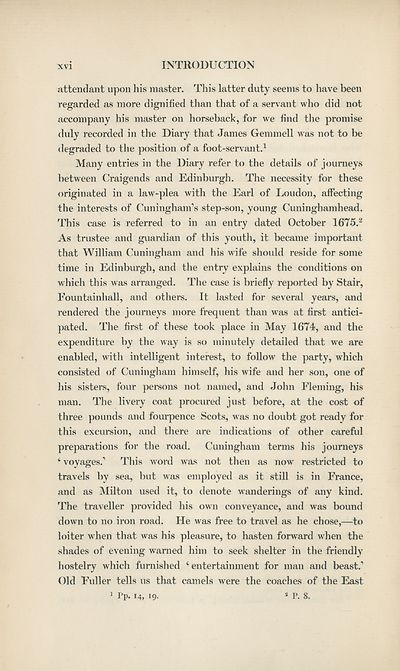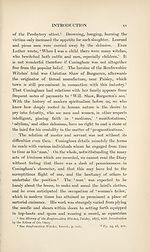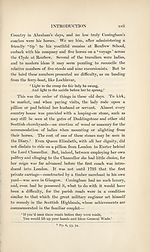Series 1 > Diary and general expenditure book of William Cunningham of Craigends ... kept chiefly from 1673 to 1680
(25) Page xvi
Download files
Complete book:
Individual page:
Thumbnail gallery: Grid view | List view

XVI
INTRODUCTION
attendant upon his master. This latter duty seems to have been
regarded as more dignified than that of a servant who did not
accompany his master on horseback, for we find the promise
duly recorded in the Diary that James Gemmell was not to be
degraded to the position of a foot-servant.1
Many entries in the Diary refer to the details of journeys
between Craigends and Edinburgh. The necessity for these
originated in a law-plea with the Earl of Loudon, affecting
the interests of Cuningham’s step-son, young Cuninghamhead.
This case is referred to in an entry dated October 1675.2
As trustee and guardian of this youth, it became important
that William Cuningham and his wife should reside for some
time in Edinburgh, and the entry explains the conditions on
which this was arranged. The case is briefly reported by Stair,
Fountainhall, and others. It lasted for several years, and
rendered the journeys more frequent than was at first antici¬
pated. The first of these took place in May 1674, and the
expenditure by the way is so minutely detailed that we are
enabled, with intelligent interest, to follow the party, which
consisted of Cuningham himself, his wife and her son, one of
his sisters, four persons not named, and John Fleming, his
man. The livery coat procured just before, at the cost of
three pounds and fourpence Scots, was no doubt got ready for
this excursion, and there are indications of other careful
preparations for the road. Cuningham terms his journeys
‘ voyages.’ This word was not then as now restricted to
travels by sea, but was employed as it still is in France,
and as Milton used it, to denote wanderings of any kind.
The traveller provided his own conveyance, and was bound
down to no iron road. He was free to travel as he chose,—to
loiter when that was his pleasure, to hasten forward when the
shades of evening warned him to seek shelter in the friendly
hostelry which furnished ‘entertainment for man and beast.’
Old Fuller tells us that camels were the coaches of the East
1 Pp. 14, 19-
a P. 8.
INTRODUCTION
attendant upon his master. This latter duty seems to have been
regarded as more dignified than that of a servant who did not
accompany his master on horseback, for we find the promise
duly recorded in the Diary that James Gemmell was not to be
degraded to the position of a foot-servant.1
Many entries in the Diary refer to the details of journeys
between Craigends and Edinburgh. The necessity for these
originated in a law-plea with the Earl of Loudon, affecting
the interests of Cuningham’s step-son, young Cuninghamhead.
This case is referred to in an entry dated October 1675.2
As trustee and guardian of this youth, it became important
that William Cuningham and his wife should reside for some
time in Edinburgh, and the entry explains the conditions on
which this was arranged. The case is briefly reported by Stair,
Fountainhall, and others. It lasted for several years, and
rendered the journeys more frequent than was at first antici¬
pated. The first of these took place in May 1674, and the
expenditure by the way is so minutely detailed that we are
enabled, with intelligent interest, to follow the party, which
consisted of Cuningham himself, his wife and her son, one of
his sisters, four persons not named, and John Fleming, his
man. The livery coat procured just before, at the cost of
three pounds and fourpence Scots, was no doubt got ready for
this excursion, and there are indications of other careful
preparations for the road. Cuningham terms his journeys
‘ voyages.’ This word was not then as now restricted to
travels by sea, but was employed as it still is in France,
and as Milton used it, to denote wanderings of any kind.
The traveller provided his own conveyance, and was bound
down to no iron road. He was free to travel as he chose,—to
loiter when that was his pleasure, to hasten forward when the
shades of evening warned him to seek shelter in the friendly
hostelry which furnished ‘entertainment for man and beast.’
Old Fuller tells us that camels were the coaches of the East
1 Pp. 14, 19-
a P. 8.
Set display mode to:
![]() Universal Viewer |
Universal Viewer | ![]() Mirador |
Large image | Transcription
Mirador |
Large image | Transcription
Images and transcriptions on this page, including medium image downloads, may be used under the Creative Commons Attribution 4.0 International Licence unless otherwise stated. ![]()
| Scottish History Society volumes > Series 1 > Diary and general expenditure book of William Cunningham of Craigends ... kept chiefly from 1673 to 1680 > (25) Page xvi |
|---|
| Permanent URL | https://digital.nls.uk/126600333 |
|---|
| Attribution and copyright: |
|
|---|
| Description | Over 180 volumes, published by the Scottish History Society, containing original sources on Scotland's history and people. With a wide range of subjects, the books collectively cover all periods from the 12th to 20th centuries, and reflect changing trends in Scottish history. Sources are accompanied by scholarly interpretation, references and bibliographies. Volumes are usually published annually, and more digitised volumes will be added as they become available. |
|---|


